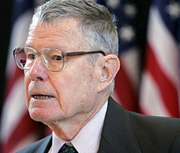 |
| University of Maryland economist Thomas C. Schelling speaks at the University of Maryland in College Park, outside Washington, after being awarded the Nobel Economics Prize for using game theory to explain conflict resolution (AFP) |
Robert J. Aumann, an Israeli-US citizen, and American Thomas C. Schelling won the 2005 Nobel Economics Prize for using game theory to explain conflict resolution.
Using game theory -- interactive decision scenarios -- thelaureatesfocused on why some people and countries manage to cooperate, while others suffer from conflict.
Their work has helped understand all kinds of conflict and cooperation, from trade fights, organized crime, political decisions and wage negotiations to outright shooting wars.
American Schelling, now 84, produced his main work during the Cold War which pitted the United States against the Soviet Union, when he used game theory methods to explain the era's most vital issues, global security and the arms race.
He showed that the ability to retaliate can be more useful than the ability to resist an attack, and that it may be good to keep your enemy in the dark over how your retaliation will look.
"These insights have proven to be of great relevance for conflict resolution and efforts to avoid war," the Nobel jury said Monday.
Building on Schelling's original ideas, Aumann then applied the tools of mathematical analysis to highlight the alternatives available to one's own country and the opponent in times of conflict.
Aumann, 75, went on to show that the choice for cooperation rather than war is easier achieved in long-term relationships rather than single encounters.
He became the first to create analysis of "infinitely repeated games", which helped understand why some people or communities cooperate better than others.
They will share the prize sum of 10 million kronor (1.1 million euros, 1.3 million dollars).
The Nobel Economics Prize, the fifth of the sixcovetedprizes to be awarded this year, is the only one not originally included in the last will and testament of the creator of the awards, Swedish inventor Alfred Nobel.
It was created by the Swedish Central Bank in commemoration of its tricentenary in 1968, and was first awarded in 1969. It is also funded by the bank.
Last week, the Nobel Peace Prize was awarded to the UN nuclear watchdog IAEA and its Egyptian director general Mohamed ElBaradei for their efforts to halt the spread of nuclear weapons.
The prizes for medicine, chemistry and physics were also awarded last week.
The winner of the Literature Prize is expected to be announced this week. The Swedish Academy discloses the date of its big announcement just 48 hours in advance, though it traditionally falls on a Thursday.
This year's Nobel laureates will receive their prizes at official ceremonies held in Stockholm and Oslo on December 10, the anniversary of the death in 1896 of Alfred Nobel.
(Agencies)
|
